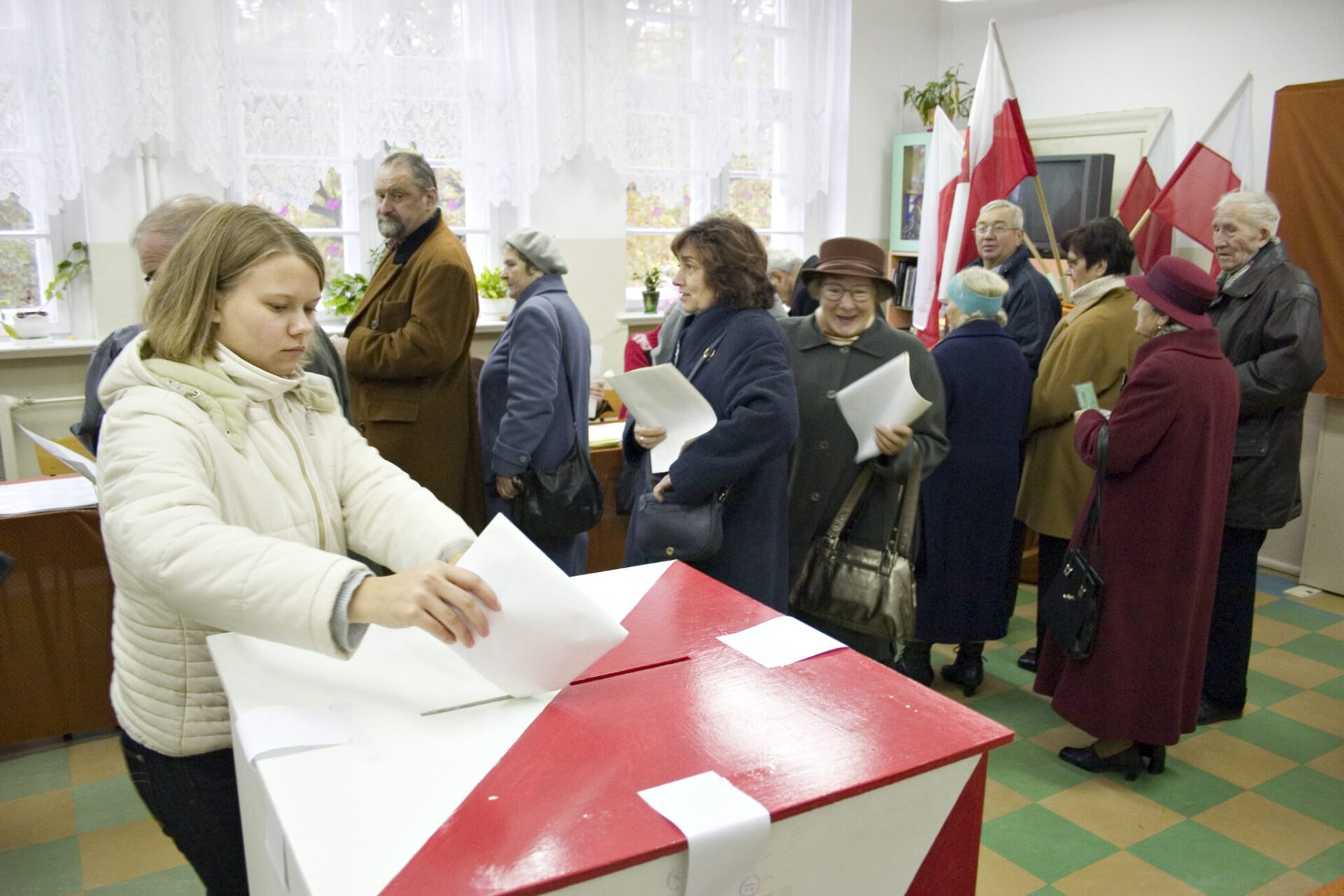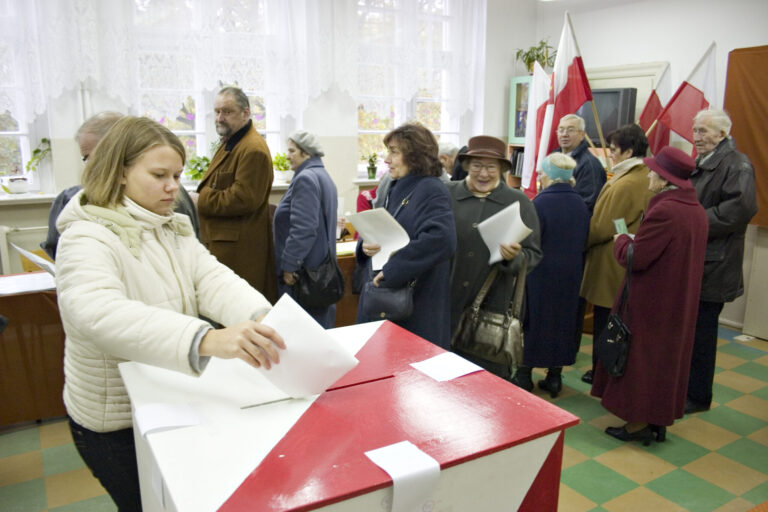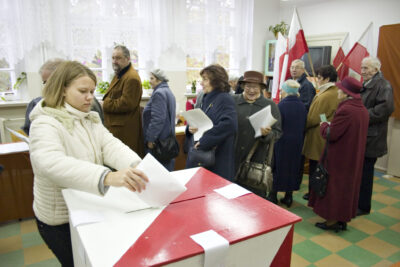Law and Justice won the elections and maintained undivided power in Poland. The leader of the ruling party Jaroslaw Kaczynski hoped for more.
Shortly after the first exit polls appeared on TV screens, giving PiS an apparent electoral victory, a close associate of Jaroslaw Kaczynski posted a photo on Twitter. It shows a moderately smiling leader of the party and a much more smiling head of the public television. Jacek Kurski, a former PiS politician and spin doctor, who turned TVP into a propaganda arm of the ruling party, had a significant share in this victory. According to the OSCE overview of the elections: “The Polish parliamentary elections were administratively prepared well, but clear media bias as well as intolerant rhetoric detracted from the otherwise competitive process.”
The ruling party won with 43.6 percent and thus again gained majority in the parliament. This is an unquestionable political success of Kaczynski and the strongest result for a political party since 1989. However, considering the overall effort and spendings of the campaign, victory came at a relatively high cost. That is why in Kaczynski’s first speech there was a tone of bitterness: “We deserved more.” Prime Minister Mateusz Morawiecki appeared to grumble about a “backpack full of stones”.
A few months before the election, the Law and Justice announced new money transfers for social programs, including 500 PLN (app. 116 EUR) monthly for each child and financial support for seniors. It promised improving health services and raising the minimal wage. At the same time, millions flowed from state-owned companies to promote government activities and support propaganda. Pro-government media fueled fear and emotions towards “enemies” – this time mainly LGBT communities and, as usual, towards immigrants. The television propaganda machine worked until the last moment. In this way, the party managed to excite and mobilize its electorate, especially in the countryside.
There are many indications that this might be the political ceiling, though. Kaczynski hoped that he would win more and would be able to prove the political hegemony of his party in Poland. One of his main goals was to push the Polish Peasants’ Party (PSL) out of the parliament. Another: to be the only right-wing force in Polish politics. He also counted on the victory, measured in the number of mandates, to be strong enough to pass any bill in 24 hours, even “without any formal procedure.” (This is a quote from Kaczynski, when he took the floor during one parliamentary debate)
It didn’t happen. Despite the weak campaign of the main opposition force, the Civic Coalition (created by i.a. Civic Platform) and other opposition parties managed to mobilize the anti-government electorate.
The 61.7 voter turnout was record-breaking in Poland (higher only in 1989). Results show that the electorate divided mainly into 2 forces (pro and anti-government). The opposition won the elections to the Senate and, when summing up the result of 3 parties, fared better than the Law and Justice. PSL (Peasants’ Party) remains in the parliament and the election strengthened its leader Władysław Kosiniak-Kamysz, who is now in the first political league. Some commentators see him as one of the strongest candidates in 2020 presidential elections.
New players show up at the scene. After four years of absence, the left-wing party returns to the Polish parliament with a mix of experienced and fresh politicians. The Civic Platform, which will soon have to choose its presidential candidate, awaits internal discussion and takeaways from the campaign.
The Law and Justice is no longer the only right-wing force, as the far-right Confederation entered the parliament. This is the only openly pro-Russian formation in Poland, so any cooperation with this party would be risky for Jaroslaw Kaczynski. Though some attempts to attract these MPs are likely to happen.
Therefore, the power in Poland does not change, but the circumstances of exercising it do. The Law and Justice will hardly ease its course or step back from plans of “media repolonization” or journalist verification. This course might be even sharpened, especially if president Andrzej Duda will be reelected in 2020. Now, the ruling party will focus on this goal.
Both sides called this, “the most important elections in 30 years.” What seems clear is that Kaczynski did not achieve such success as Viktor Orban in the second term of his government (in 2010), when he gained a 2/3 majority. In this sense, there will be no Budapest in Warsaw (as Kaczynski used to declare). Moreover, after the recent local government elections in Hungary, the situation in Budapest itself changed. Orban lost power in the city as the opposition candidate won the mayoral election. These unexpected challenges mean new perspective for two old friends in Visegrad.
Anna Gielewska is co-founder and editor-in-chief of VSquare and co-founder of Polish investigative outlet FRONTSTORY.PL. She is also vice-chairwoman of Fundacja Reporterów (Reporters Foundation). A journalist specializing in investigating organized disinformation and propaganda, Gielewska was the John S. Knight Fellow at Stanford University (2019/20) and has been shortlisted for the Grand Press Award (2015, 2021, 2022) and the Daphne Caruana Galizia Award (2021, 2023). She was the recipient of the Novinarska Cena in 2022.







